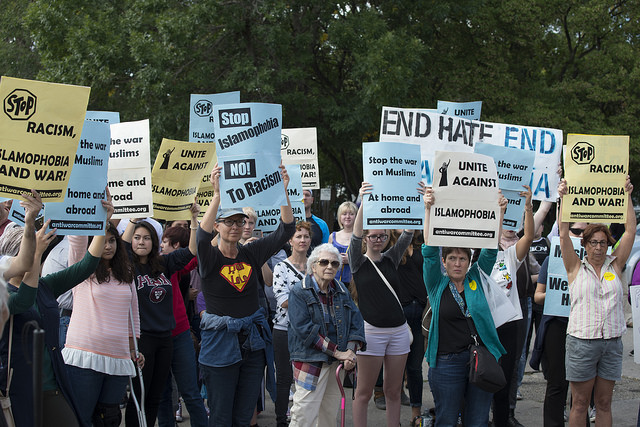This week there were two very disturbing developments in Canada. One was that Hamish Marshall, the former Rebel Media director, is now the 2019 Conservative Party campaign chair, and the other is that the Quebec Liberal government has passed Bill 62, a law that would force Muslim women who wear a niqab or burka to uncover their faces to use public services.
A few months ago, many media outlets published triumphal articles about the demise of Rebel Media asking, “Is this the beginning of the end for Rebel Media?” and discussing the Rebel Media meltdown. The Rebel Media site went down, and Google and others have made noise about cracking down on hate sites. Politicians, including Andrew Scheer, momentarily distanced themselves from Rebel Media, but Hamish Marshall, who until recently was listed as a director of Rebel Media, ran Andrew Scheer’s run for the federal Conservative Party leadership. The “alt-right” is an organizing machine, and organizing around hate has worked very well for them. The fact that Hamish Marshall is going to be the 2019 Conservative Party campaign chair is dangerous, because he is an effective campaigner who signals the further normalization and embrace of the “alt-right”.
Those organizing and campaigning around Islamophobia just made inroads in Quebec. The province recently passed Bill 62; here is an article detailing some of the challenges the Bill may pose. I know many argue that the Bill is not Islamophobic, but instead is a function of Quebec’s adherence to the principle of laïcité, or the secularity. Others may argue for Bill 62 in terms of feminism and freeing women from oppression. However, Arundhati Roy dismissed these arguments in a statement responding to the several municipalities in France that banned the burkini on beaches:
“When, as happened recently in France, an attempt is made to coerce women out of the burqa rather than creating a situation in which a woman can choose what she wishes to do, it’s not about liberating her, but about unclothing her. It becomes an act of humiliation and cultural imperialism. It’s not about the burqa. It’s about the coercion. Coercing a woman out of a burqa is as bad as coercing her into one. Viewing gender in this way, shorn of social, political and economic context, makes it an issue of identity, a battle of props and costumes. It is what allowed the US government to use western feminist groups as moral cover when it invaded Afghanistan in 2001. Afghan women were (and are) in terrible trouble under the Taliban. But dropping daisy-cutters on them was not going to solve their problems.”
While some may argue that these developments are not as bad as others may think, I believe that they are important organizing developments and it is up to us as activists to build the fightback now.
So, what can we do?
Learn: Friends of the #stophateca blog the Anti-Racist Canada Collective (ARC Collective) and the Groupe de recherche sur l’extrême droite et ses allié-e-s (GREDA) are among the groups that have been building our knowledge of ‘who’s who’ in the Canadian “alt-right” for decades. Both of these organizations track racist individuals and organizations, and flag instances where the racists are being welcomed by politicians and others. Support them, and let us know about other groups doing similar work in Canada. The National Council of Canadian Muslims (NCCM) is a important voice standing up to Islamophobia and, among other things, they maintain a database of hate crimes in Canada. Visit their websites, read what they are publishing and support the work of organizations like these. If you have information about racists, share it with them and if you witness a hateful incident, report it to the authorities and to the NCCM as well.
Engage and Confront: While it is important to build community with each other, develop teach-ins with centrist and like-minded audiences, and hold peaceful rallies with no opposition, it is also important to engage and confront the racists. Our most important task is to organize each other, in our own communities and not to remain silent or walk away when you see and hear something that could be racist. Some people have mentioned that they disagree with the tactics of people confronting the racists at their rallies. In every case I have encountered, most of the people at the rallies are engaged in peaceful protest. Basically, however you do it, whether it is at the dinner table or at rallies, it is up to us to confront racism in our mundane lives. It is also up to us to engage people who are promoting the tactics we don’t agree with. We are generally working towards the same end and no one can proport to know what will work. This is rabble.ca’s most recent Activist Toolkit posts which includes a great guide from the Southern Poverty Law Centre on community organizing around racism. Here is a great podcast about two cities’ anti racist initiatives. There are a lot more tools which are a part of our stop hate series. There is engagement happening, and there is a lot more that needs to happen. We are happy to amplify the work you do, so please send us tools and ideas you use.
Support: The most important thing, however, is to support people and organizations who are facing and standing up to racism. Don’t remain silent and don’t turn away. There should be a challenge to Bill 62 in the courts, support it. There will be other initiatives, do everything you can. Bill 62 and the appointment of Hamish Marshall are setbacks for those of us organizing against the further normalization of the “alt-right” and Islamophobia in Canada. There may well be other things which happen. Let us not let this become the new normal.
Image: Fibonacci Blue/flickr
Like this article? Please chip in to keep stories like these coming.




